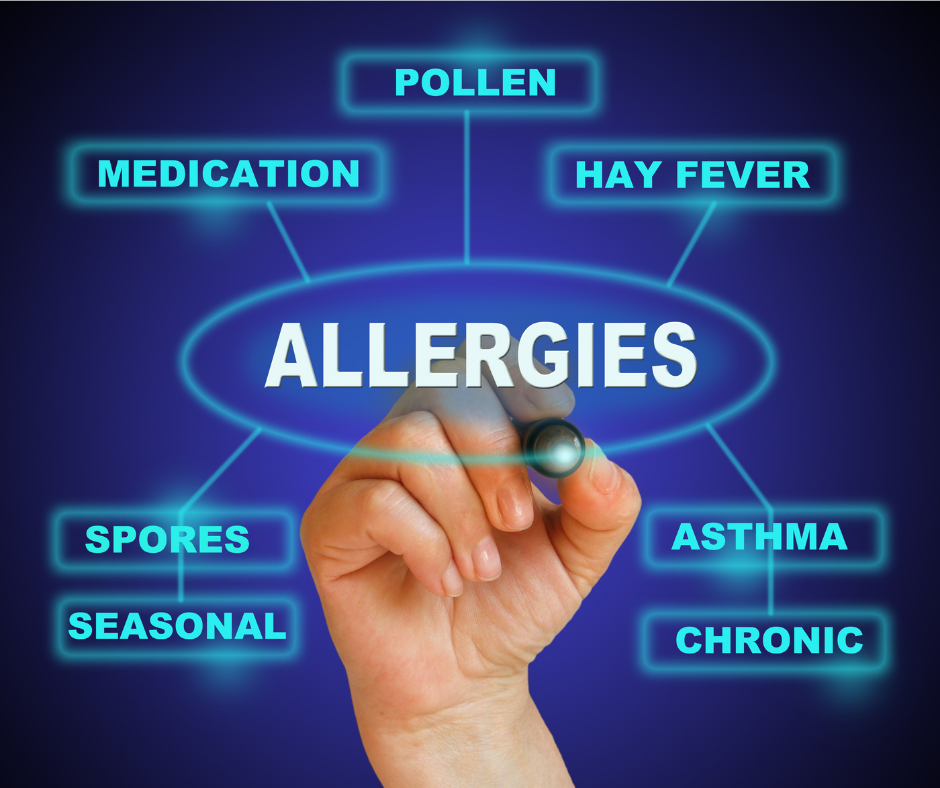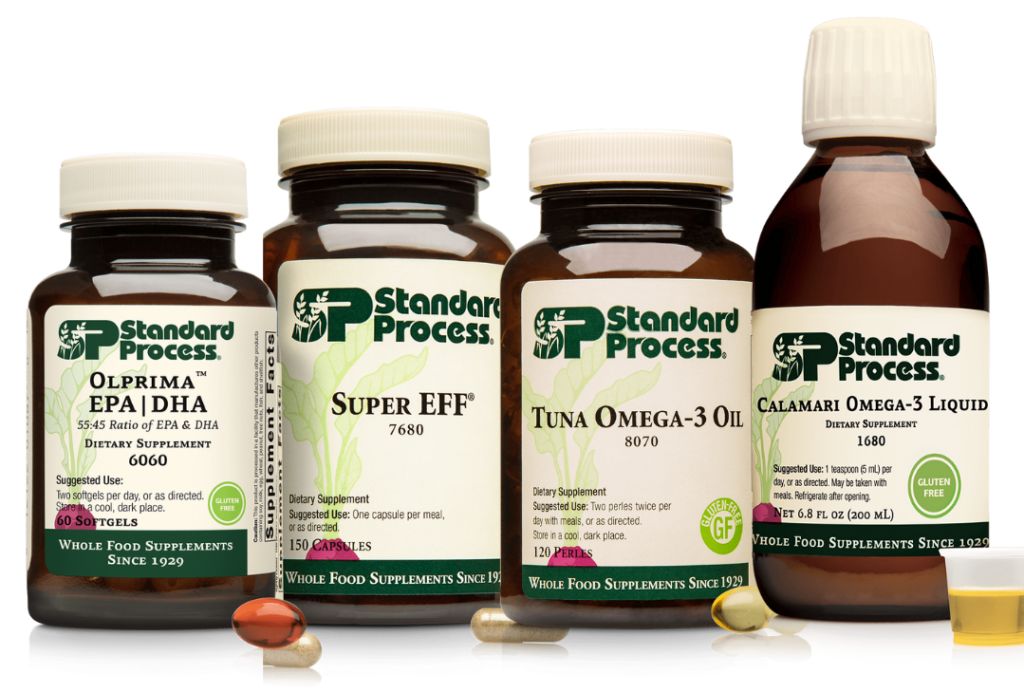By Claire Bacon, ACN, CNC
Wow – how far we have come! Early in the 20th century, scientists did not consider Omega 3 fatty acids to have much benefit. It was not until 1929 that fatty acids were discovered to be essential nutrients required to maintain health. At this time approximately 90 years later, hundreds of studies exist on fatty acids and their role in human health.
Fish oil is probably the most well-known Omega 3 dietary supplement used by both adults and children. Omega 3 fatty acids are associated with reducing the risk of coronary heart disease, mental abnormalities, and developmental disorders. In addition, they serve to normalize functions of and reduce inflammation of cellular membranes. In this way, essential fatty acids can be extremely beneficial to reduce symptoms of allergies.

Basics of Omega 3 Fatty Acids
There are three main types of Omega-3 fatty acids (ALA, EPA, DHA). These build the phospholipid structures of the cell membrane.
ALA is the precursor for both EPA and DHA. It must be obtained from the diet, as the body cannot make ALA on its own. This fatty acid is associated with neuroprotection, vasodilation of arteries, and neuroplasticity. Dietary sources of ALA include fish, other seafood, and flaxseed oil – foods that we typically don’t get enough of.
EPA is associated with a positive effect on emotional balance and inflammation.
DHA is the most abundant omega-3 in the brain. It is a major component of the neuronal membrane and plays an important role in normal brain structure and cognition.
Various functions of omega-3s include:
- Ensure proper hormonal messaging
- Source of energy
- Regulation of cardiovascular, pulmonary, immune, and endocrine systems.
Both EPA and DHA modulate the inflammatory response. Specifically, supplementation with EPA and DHA is associated with:
- Decreased markers of inflammation, including allergic inflammation
- Healthy capillaries and microcirculation
- Normalizes triglycerides
- Healthy cognitive function
- Improves lung functioning
- Reduced risk of heart disease due to less inflammation in the arteries.
Omega 3 Fatty Acids and Allergies
Seasonal allergy symptoms can begin suddenly when trees and grasses begin to release their pollens into the air. As a result, the immune system responds to the inhaled pollen by rapidly producing antibodies. These antibodies attach to the allergens and cause mast cells on various cell membranes to release histamine. Histamine is the substance that irritates the membranes of the nose, eyes, throat, and respiratory tract, producing excess mucus.
The top nutritional strategy to experience relief is to strengthen and heal the immune barriers such as the mucus membranes of the upper respiratory and digestive tracts. An effective way to do that is through the use of Omega 3 fatty acids to reduce effects of allergies. The fatty acids enhance the function of the cell membrane, modulating the immune response so there is no over-reaction.
When your cell membranes are healthy, they can bring nutrients into the cell and release toxic waste products out of the cell. In essence, their innate receptor processes just work perfectly. Without sufficient fatty acids, every function the cell is trying to do is at a disadvantage. Especially when defending from allergies!
Mast cells are innate immune cells that stimulate allergic processes. The interaction of an antigen with the immune receptor starts a signaling cascade that culminates with mast cell activation – this is what causes symptoms to start. Omega-3 fatty acids decreased the activation of mast cells in various studies. The dampening effect of omega-3 fatty acids on mast cell activation decreases the severity of mast cell-associated conditions, like allergies or atopic dermatitis.

Dietary Omega 3 Fatty Acids
A balanced dietary intake ratio of omega-6s and omega-3s reduces inflammatory activity. When you have a good balanced ratio, you generally have a lower risk of chronic conditions like cardiovascular disease, cancer, and allergies. The dietary intake of omega-6 to omega-3 ratio should not exceed 4:1. Unfortunately, the intake ratio of omega-6 to omega-3 in the United States is commonly as high as 20:1.
Scientists consider Omega-3 fatty acids “essential” because the body doesn’t naturally make them. So, a healthy diet must include a good variety of fatty acids. Good dietary sources include fatty fish, nuts, seeds, and vegetable oils. Nuts and seeds contain ALA, whereas fish oil is a better source of EPA and DHA. The best fish sources are: mackerel, salmon, sardines, trout, tuna, bluefish and herring.

If you can’t get enough of these in your diet, a high quality fish oil supplement can help. We have a handy chart here to determine your suggested daily dose.
Supplement Highlight

Tuna Omega 3 is the most foundational and affordable fish oil we offer. It comes in perles you can swallow, or orange-flavored chewables for kids! It’s a great source of EPA and DHA in a natural balance with each other.
Calamari Oil is our favorite for kids, because it tastes great right off the spoon! This one has our highest concentration of DHA, so it is very supportive of cognition and for people with focus issues.
Olprima EPA/DHA is more concentrated than the others we offer. It maintains a good balance between EPA and DHA, but puts more bang-for-your-buck in each tiny perle.
Super EFF is a source of essential fatty acids in capsule form. This product contains pre-digested fats that are easy to absorb. This one is great for people who desperately need more EFAs, but their liver is not really up to the task. We love Super EFF for anyone with a chronic, degenerative condition or a weak digestive system.
And last but not least, Cod Liver Oil is a perennial favorite. Even our great-grandparents knew of the widespread health benefits of Cod Liver Oil. It’s a great source of EPA and DHA, with naturally occurring Vitamins A and D. When you need to heal the gut lining or calm down inflammation, Cod Liver Oil is the best!

Closing Thoughts
Although the average Western diet tends to favor the inflammatory Omega-6 fatty acids, an easy lifestyle change can shift the balance. Small tweaks such as increasing fish and seafood, plus supplementing omega-3 fatty acids, can make a big difference in reducing your inflammation. These lifestyle changes could tip the balance in favor of omega-3s, welcoming in a multitude of health benefits not only during allergy season, but also year-round.



